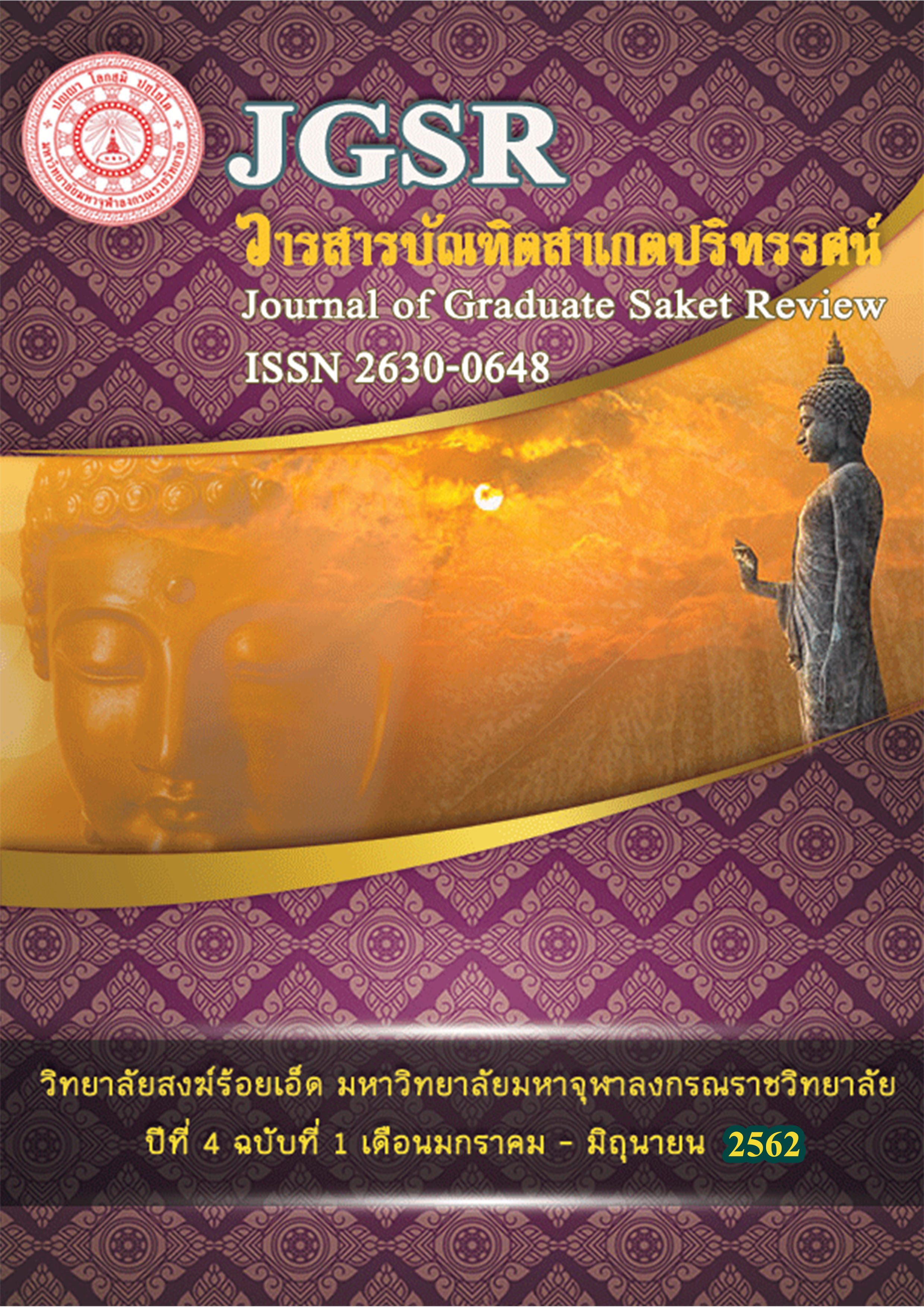ภูมิปัญญาท้องถิ่นกับความเชื่อทางพระพุทธศาสนา
Main Article Content
บทคัดย่อ
บทความนี้มีวัตถุประสงค์เพื่อนำเสนอ ความเชื่อภูมิปัญญาท้องถิ่นกับความเชื่อทางพระพุทธศาสนา ภูมิปัญญาท้องถิ่นเกี่ยวกับความเชื่อเกิดขึ้นจากความคิดคำนึงว่าสิ่งนี้ดีสิ่งนั้นไม่ดี จะต้องส่งผลกระทบอย่างนั้น ความเชื่อจึงปรากฏเป็นข้อห้ามคำสอนของโบราณภูมิปัญญาท้องถิ่น เป็นสิ่งที่มีลักษณะของการสะสม เรียนรู้ สืบสาน สืบทอด และต่อเนื่องจากอดีตถึงปัจจุบันจากบรรพบุรุษสู่ชนรุ่นหลังกันมาอย่างยาวนานและมีความสัมพันธ์กันและสอดคล้องกับวิถีชีวิตดั้งเดิมของชาวบ้าน จนไม่สามารถแยกออกจากกัน ความเชื่อในทางพระพุทธศาสนาสอนให้เชื่อบนฐานของเหตุผล เชื่อกรรม หรือการกระทำ เชื่อผลจากการกระทำทุกอย่างจะเกิดขึ้นอย่างเหมาะสมกับเหตุที่ทำลงไป และความเชื่อนี้จะนำไปสู่การศึกษา และการปฏิบัติตนในเรื่องต่าง ๆ ด้วยการพัฒนาจิตให้เข้าถึงปัญญา เพื่อให้สุขภาพกายและสุขภาพจิตดีอย่างครบถ้วนภูมิปัญญาท้องถิ่นกับความเชื่อทางพระพุทธศาสนา สันนิษฐานว่าเมื่อพระพุทธศาสนาแผ่อิทธิพลเข้าในดินแดนแถบนั้น ๆ คำสอนของพระพุทธเจ้าที่มีแฝงอยู่ในภูมิปัญญาท้องถิ่นเกี่ยวกับควาเชื่อก็น่าจะเริ่มแต่เมื่อนั้นประกอบกับกับภูมิปัญญาท้องถิ่นกับความเชื่อดั้งเดิมที่มีอยู่ก่อนแล้ว ซึ่งน่าจะสอดคล้องกับหลักธรรมในทางพระพุทธศาสนาจึงได้ผสมผสานได้อย่างกลมกลืนแล้วกลายมาเป็นวัฒนธรรม ขนบธรรมเนียม จารีต ประเพณีให้คนในสังคมได้ประพฤติปฏิบัติสืบต่อกันมาตราบเท่าทุกวันนี้
Article Details
เนื้อหาและข้อมูลในบทความที่ลงตีพิมพ์ในวารสารบัณฑิตสาเกตปริทรรศน์ ถือเป็นข้อคิดเห็นและความรับผิดชอบของผู้เขียนบทความโดยตรงซึ่งกองบรรณาธิการวารสาร ไม่จำเป็นต้องเห็นด้วย หรือร่วมรับผิดชอบใด ๆบทความ ข้อมูล เนื้อหา รูปภาพ ฯลฯ ที่ได้รับการตีพิมพ์ในวารสารบัณฑิตสาเกตปริทรรศน์ ถือเป็นลิขสิทธิ์ของวารสารบัณฑิตสาเกตปริทรรศน์ หากบุคคลหรือหน่วยงานใดต้องการนำทั้งหมดหรือส่วนหนึ่งส่วนใดไปเผยแพร่ต่อหรือเพื่อกระทำการใด ๆ จะต้องได้รับอนุญาตเป็นลายลักอักษรจากวารสารบัณฑิตสาเกตปริทรรศน์ ก่อนเท่านั้น
เอกสารอ้างอิง
เดือน คำดี. (2541). ศาสนศาสตร์. ภาควิชาปรัชญาและศาสนาคณะสังคมศาสตร์. กรุงเทพมหานคร : มหาวิทยาลัยเกษตรศาสตร์.
นิธิ เอี่ยวศรีวงศ์. (2536). ภูมิปัญญาท้องถิ่นกับการจัดการทรัพยากร ทิศทางไทย. กรุงเทพมหานคร : ม.ป.ท.
นันทสาร สีสลับ. (2542). ภูมิปัญญาไทย. สารานุกรมไทยสำหรับเยาวชน. เล่ม 23. พิมพ์ครั้งที่ 2. กรุงเทพมหานคร : สำนักงาน
คณะกรรมการการศึกษาแห่งชาติ.
พระพรหมคุณาภรณ์ (ป.อ. ปยุตฺโต). (2559). พจนานุกรมพุทธศาสตร์ ฉบับประมวลธรรม. พิมพ์ครั้งที่ 13. กรุงเทพมหานคร : สำนัก
พิมพ์ผลิธัมม์.
พระเทพเวที (ประยุทธ์ ปยุตฺโต). (2535). พุทธศาสนาในฐานะเป็นรากฐานของวิทยาศาสตร์. กรุงเทพมหานคร. มหาจุฬาลงกรณราช
วิทยาลัย.
พระธรรมปิฎก (ป.อ. ปยุตฺโต). (2544). คนไทยกับป่า. กรุงเทพมหานคร : กระทรวงศึกษาธิการ.
มหาจุฬาลงกรณราชวิทยาลัย. (2539). พระไตรปิฎกภาษาไทย ฉบับมหาจุฬาลงกรณราชวิทยาลัย. กรุงเทพมหานคร : โรงพิมพ์มหา
จุฬาลงกรณราชวิทยาลัย.
มหาจุฬาลงกรณราชวิทยาลัย วิทยาเขตขอนแก่น. (2538). โฮมของดี ประเพณีอีสาน. จังหวัดขอนแก่น : โรงพิมพ์คลังนานาวิทยา.
วิทย์ เที่ยงบูรณธรรม. (2536). พจนานุกรมไทย. พิมพ์ครั้งที่ 2. กรุงเทพมหานคร : โรงพิมพ์ประชุม ทองกาน.
สำนักงานคณะกรรมการการประถมศึกษาแห่งชาติ. (2537). แนวทางการพัฒนาหลักสูตรท้องถิ่น โดยภูมิปัญญาชาวบ้านในโรงเรียน.
กรุงเทพมหานคร : โรงพิมพ์คุรุสภา.
สำนักงานคณะกรรมการการศึกษาแห่งชาติ. (2544). แนวทางส่งเสริมภูมิปัญญาไทยในการจัดการศึกษา. กรุงเทพมหานคร : พิมพ์ดี.
เสาวภา ไพทยวัฒน์. (2538). ลักษณะทางวัฒนธรรมไทย. กรุงเทพมหานคร : พิมพ์ลักษณ์.
เอกวิทย์ ณ ถลาง. (2546). ภูมิปัญญาท้องถิ่นกับการจัดการความรู้. กรุงเทพมหานคร : อมรินทร์.
ศักดิ์ชัย เกียรตินาคินทร์. ภูมิปัญญาไทยพัฒนาไทย. วารสารวัฒนธรรมไทย. 7-17 เมษายน- พฤษภาคม 2542.
พจนานุกรมฉบับราชบัณฑิตยสถาน. (ออนไลน์), แหล่งท่า : http://www.bdword.com/thai-meaning-or-translation-of-
insight. 28 ธันวาคม 2561.


